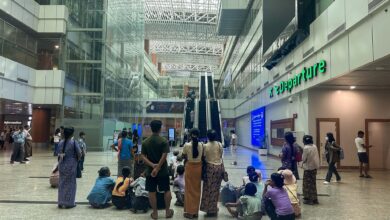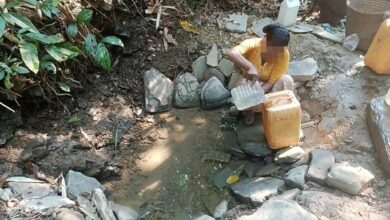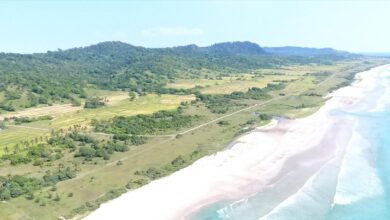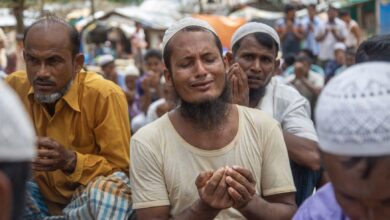
On the night of July 6, a loud chorus of voices singing “Kabar Ma Kyay Bu,” the anthem of Myanmar’s pro-democracy struggle, rose from deep inside Mandalay’s Obo Prison. Ko Agga, an anti-coup activist who had been detained there for more than a year at this point, knew exactly where the sound was coming from.
Although he was six buildings away, he could hear the words, sung to the tune of the song “Dust in the Wind,” clearly as they emerged from the prison’s Building 3: “We will never forget. This history written with our blood.”
There were hundreds of political prisoners locked up inside Building 3, and they were singing to commemorate an event that took place 60 years earlier—the killing of student activists and the dynamiting of Yangon University’s Student Union building by Myanmar’s first military junta on July 7, 1962.
“I had goosebumps listening to them. I also sang along,” said Ko Agga, whose real name is Ye Win Htun.
Soon after it began, the protest was brutally crushed. Ko Agga could hear the beatings and the cries of pain as the prisoners were dragged out into the open, to an area that was often used for chinlone, or caneball, matches.
“I could feel my blood rushing. My breathing got faster and faster as my anger intensified,” he recalled.
The next morning, he saw pools of blood in the place where some 30 prisoners had been savagely attacked before being thrown into solitary confinement cells.
“It was an ugly sight,” he said of the evidence of the previous night’s violence. “All we could do was wash the blood away.”

Inside Obo’s walls
Ko Agga, 29, was arrested on February 4, 2021, just three days after the military seized power again after a decade of quasi-civilian rule. He was one of 16 protesters who had gathered in front of Mandalay’s University of Medicine that day to demand that the newly installed regime step down, and one of four who were captured in the ensuing crackdown.
Even at that very early stage after the coup, the junta was ready to pounce, he said. At least a dozen regime agents were recording their protest, according to Ko Agga. And many more were called in when it came time to start making arrests.
The protesters had been careful not to exceed the limit on crowd sizes imposed before the coup as a measure to prevent the spread of Covid-19. Nevertheless, when they were brought before the Chanmyathazi Township Court the next day, they were charged not only under Article 19 of the Peaceful Assembly and Peaceful Procession Law, but also under Section 25 of the Natural Disaster Management Law for violating pandemic restrictions.

Ko Agga and his comrades were fortunate in a sense: They were spared the lengthy and brutal interrogations that would become the norm as protests spread across the country. But they still had to face more than a year inside Obo Prison, one of Myanmar’s most notorious detention centres.

Located northeast of the city centre at the foot of Mandalay Hill, the prison holds some of the country’s most prominent political detainees, including Dr. Zaw Myint Maung, the ousted chief minister of Mandalay Region, former Mandalay mayor Dr. Ye Lwin, and Win Htein, a patron of the deposed ruling party, the National League for Democracy (NLD). Win Mya Mya, the party’s chair for Mandalay Region, and Ywet Nu Aung, a Mandalay-based lawyer who represented Dr. Zaw Myint Maung, are also prisoners there.
Ko Agga soon learned that political prisoners were treated worse than ordinary criminals inside the prison’s walls. In fact, regular convicts assigned to supervise them had the right to beat and steal from them, he said.
“If we got in their bad books, we were kicked and beaten for no reason. We just had to take it. They could do no wrong,” he explained.
If they did complain about their treatment, or about personal possessions that went missing, political prisoners were accused of protesting, which made them even more vulnerable to attack.
Dying behind bars
As the prison began to fill up with others opposed to the regime, conditions grew even worse, according to Ko Agga.
“At first, they gave us meat curry once or twice a week, but this was reduced to once every month or two due to the increased number of political prisoners,” he said. The rest of the time, they had to survive on a thin, watery bean curry, served with barely edible rice.
There was also very little medication available for prisoners who fell ill. “The prison hospital has doctors but no medicine. They prescribe paracetamol for every condition. Even if a prisoner has scabies, they have to wait until it spreads to the whole body to get a small tube of cream,” said Ko Agga.
Under the Prisons Act, prisoners are allowed to receive food, clothing, and other necessities from outside sources. According to Ko Agga, that was the only way to get any kind of medication. But even that was not guaranteed, as prisoners were routinely denied their basic rights.


True to form, the prison authorities came down hard when Ko Agga and four others banded together to request that their rights be respected.
“They accused us of protesting, beat us, and sent us to solitary confinement,” he said.
It is not unusual for prisoners to die due to the extremely poor conditions inside Obo Prison, or as a result of their brutal treatment at the hands of prison authorities.
“Some have lost their lives because they were denied medical treatment. In some cases, their families are not even informed of their death before they are buried,” said one lawyer who has represented inmates of the prison.
Another lawyer described a client who became so malnourished that he didn’t have the strength to appear in court.
“My client was starved while he was locked up in solitary confinement. For a long time, he couldn’t even attend his own court hearings. After he was finally released, I could see that he had lost a lot of weight and was in very poor health,” he said.
Sometimes the violence was more direct, and even more lethal.
In June, at least two inmates of the prison were beaten to death with metal batons during a crackdown that also left at least 13 others injured, according to both lawyers. And a prisoner who was recently released reported a similar incident on August 8—the anniversary of the start of Myanmar’s pro-democracy movement—that resulted in at least one death.

Ready to return to the revolution
Ko Agga and his three comrades were released in late October, a few days before completing their sentences of one year and nine months for incitement. During his time behind bars, he experienced hellish conditions and inhuman treatment, both as a victim and as a witness.
“Detainees are starved, bound, and beaten during interrogation. Some youths and LGBT people are sexually assaulted. Some come out of the interrogation centre blind in one eye or unable to use one of their legs. Most inmates need therapy to heal their mental trauma,” he said.
Now staying in a safe location, Ko Agga is able to reflect on his ordeal and begin his own process of healing.
“I used to be very quick-tempered. But I was close to insanity when I came out of prison—quiet and stupefied. I couldn’t even picture my mother’ face when I was in prison,” he said.
But far from breaking his spirit, his time inside Obo Prison only strengthened his resolve to defeat the enemy of his generation—the regime that overthrew the country’s elected government on February 1, 2021.
“I was traumatised, but I pulled myself together for the sake of the revolution,” he said. “I’m not afraid to go back to prison. We have lost our rights, and must fight to win them back for future generations.”



